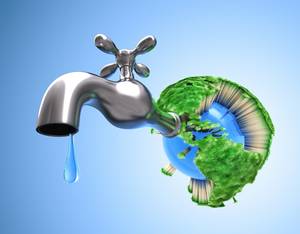Alexandra Dapolito Dunn Reports from World Justice Forum IV.
Editor’s Note: Alex Dunn’s follow-up to her first post from World Justice Forum IV at The Hague underscores EarthDesk’s recent coverage of global water issues: part one of our water security series: the challenge of transboundary waters, the complexity of local health-related water problems in the developing world, and the financial obstacles to modernizing water infrastructure.
“The flow of water does not observe modern political boundaries,” cautioned Alex in her email to us. In some places, methods for international cooperation must, by necessity, transcend centuries of cultural and political conflict, or corruption. This could require a treaty, or boots on the ground. Happily, solutions were the preoccupation of the panel from which Alex reports. – John Cronin
Greetings again from The Hague and World Justice Forum IV. At the Wednesday breakout session on Sustainable Water Solutions we discussed a diversity of topics ranging from transboundary waters to public health to infrastructure. A panel of experts from around the world, capably moderated by John Oldfield, CEO of WASH Advocates (USA), encapsulated some of the planet’s most pressing water issues. Their charge was to:
Consider the important improvements needed in order promote better access to safe drinking water; the role of technology and governments in water management and infrastructure; and the importance of water safety in order to meet the Millennium Development Goals.
While the challenges of achieving international water security and overcoming border disputes preoccupied many of the panelists, local political obstacles on the ground can be as daunting. One passionate questioner from Cameroon noted that passing funding through governments for water infrastructure and sanitation often exposes it to corruption. She suggested, for example, that directly providing filters for water to communities in Cameroon might be more effective.
This raised a very perplexing point – by avoiding government we may avoid corruption, at the same time we will not be building capacity and providing an opportunity for better action and the rule of law. Members of the panel were agreed that it would be most beneficial for the World Justice Project to add to its Rule of Law Index elements that capture equitable access to water and responsible use and management of transboundary waters.
Because I work full-time in the field of water, I cannot think of a more illuminating panel. I am privileged to have attended, and equally delighted to share the summary below with EarthDesk.
 Professor Anders Jägerskog, Associate Professor & Director of Knowledge Services, Stockholm International Water Institute (Sweden) began by noting the prevalence of governance issues surrounding transboundary waters: more than 267 shared rivers, 300+ shared aquifers, and numerous shared lakes around the globe. He noted that in many places the actual sharing of rivers and seas is not a difficulty as long as there is abundant water. It is the scarcity of water that causes and increases conflict. He advocated for the adoption of the 1997 Law of the Non-Navigational Uses of International Watercourses – the only “treaty governing shared freshwater resources that is of universal application.” Already tatified by 31 nations, it needs 35 to come into force. Several NGOs, such as the World Wildlife Fund are advocating for its passage.
Professor Anders Jägerskog, Associate Professor & Director of Knowledge Services, Stockholm International Water Institute (Sweden) began by noting the prevalence of governance issues surrounding transboundary waters: more than 267 shared rivers, 300+ shared aquifers, and numerous shared lakes around the globe. He noted that in many places the actual sharing of rivers and seas is not a difficulty as long as there is abundant water. It is the scarcity of water that causes and increases conflict. He advocated for the adoption of the 1997 Law of the Non-Navigational Uses of International Watercourses – the only “treaty governing shared freshwater resources that is of universal application.” Already tatified by 31 nations, it needs 35 to come into force. Several NGOs, such as the World Wildlife Fund are advocating for its passage.
Jagerskog also noted the recent “globalization” of the United Nations Economic Commission on Europe’s Commission on Transboundary Water. From the UNECEC site:
Initially negotiated as a regional instrument, the Convention was amended in 2003 to allow accession by all the United Nations Member States. The amendments entered into force on 6 February 2013, turning the Convention into a global legal framework for transboundary water cooperation. It is expected that non-ECE countries will be able to join the Convention as of end of 2013.
Many have said that water will be the source of the next war in the Middle East. Jagerskog believes this reflects an overemphasis on political statements. Rather, he finds water a reason for countries to work together to achieve peace, and contends productive efforts will be those focused on cooperation around water. For example, two thirds of rivers lack agreements regarding water sharing. He particularly cited increased food imports and virtual water as solutions to some scarcity issues, and that conservation can address others.
 Ebele Okeke, Water and Sanitation Hygiene Ambassador for Nigeria (Nigeria) said, “Governments must make sure the poor have access to water, no matter what.” She believes water solutions really are water sanitation and hygiene solutions. She emphasized the importance of teaching proper hygiene and sanitation to children, and the devastating effect on girls who often stop attending school due to poor sanitary conditions, adding that in Nigeria a city school may have only two toilets for 300 students.
Ebele Okeke, Water and Sanitation Hygiene Ambassador for Nigeria (Nigeria) said, “Governments must make sure the poor have access to water, no matter what.” She believes water solutions really are water sanitation and hygiene solutions. She emphasized the importance of teaching proper hygiene and sanitation to children, and the devastating effect on girls who often stop attending school due to poor sanitary conditions, adding that in Nigeria a city school may have only two toilets for 300 students.
 Gidon Bromberg, Director, Friends of the Earth Middle East (Israel) focused on the role of civil society in the water sector and the importance of a civil society watchdog. Although providing more water is crucial, he believes that merely increasing capacity through approaches such as desalination are insufficient. He noted that although Israel’s water supply may be plentiful because it leads in desalination and membrane technology, it is not ultimately sustainable because there is no effective sharing of water across borders or with nature.
Gidon Bromberg, Director, Friends of the Earth Middle East (Israel) focused on the role of civil society in the water sector and the importance of a civil society watchdog. Although providing more water is crucial, he believes that merely increasing capacity through approaches such as desalination are insufficient. He noted that although Israel’s water supply may be plentiful because it leads in desalination and membrane technology, it is not ultimately sustainable because there is no effective sharing of water across borders or with nature.
Addressing the canal to connect the Dead and Red Seas, a proposal by a partnership of Israel, Jordan and the Palestinian Authority, Bromberg said while the canal would bring more water, it would not promote the sustainable use of water, because there is no limit to the amount of water that people will use once it is made available.
 Scott Rickards, President, CEO, & Co-Founder, Waterfund LLC (USA) brought a needed financial perspective. He said that, generally speaking, we have less access to clean water in major urban areas than we once had, and there is less cheap water available. Because the amount of water in the world cannot change, there is, therefore, a crisis of investment. But when it comes to private investment in water projects, the return on investment is not there.
Scott Rickards, President, CEO, & Co-Founder, Waterfund LLC (USA) brought a needed financial perspective. He said that, generally speaking, we have less access to clean water in major urban areas than we once had, and there is less cheap water available. Because the amount of water in the world cannot change, there is, therefore, a crisis of investment. But when it comes to private investment in water projects, the return on investment is not there.
“Talk to any investment banker and they’ll tell you water is at the top of the list,” but insufficient attention is being paid by the financial markets to water. His answer is to treat water like all other sectors — create a risk market in water infrastructure to spread risk among insurers and investors, and to increase dramatically the financial investment in water.
«« »»
 Alexandra Dapolito Dunn is Executive Director of the Association of Clean Water Administrators, former Assistant Dean of Environmental Law, Pace University School of Law, and Chair, American Bar Association Section of Environment, Energy, and Resources. @cleanwaterACWA
Alexandra Dapolito Dunn is Executive Director of the Association of Clean Water Administrators, former Assistant Dean of Environmental Law, Pace University School of Law, and Chair, American Bar Association Section of Environment, Energy, and Resources. @cleanwaterACWA










